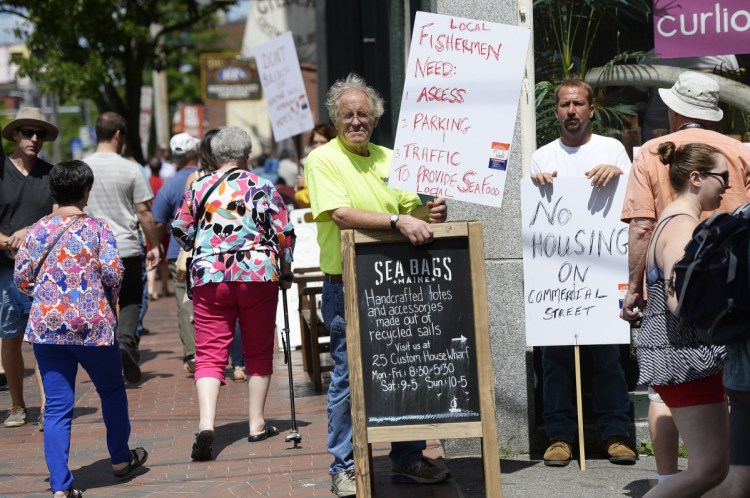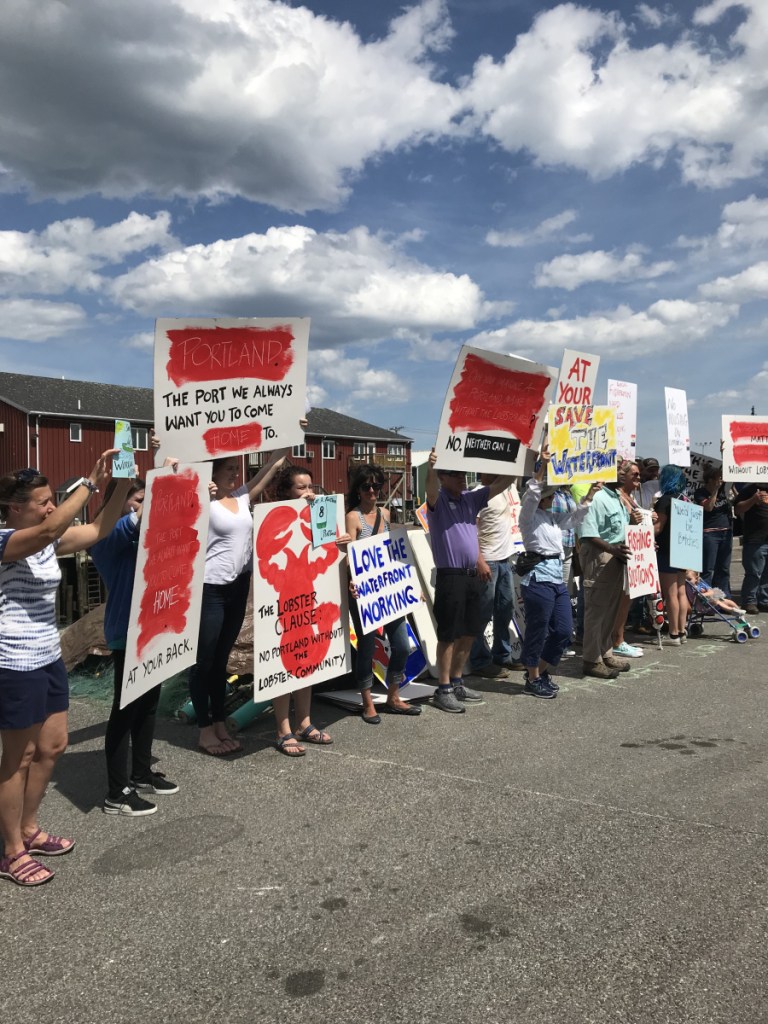With each condominium, hotel or other nonmarine building that’s developed on Portland’s waterfront, those who depend on that land at the harbor’s edge say they lose a bit of their livelihood.
“You’ve nourished us with your harvest but also with a tremendous sense of place, and we’d all be dramatically less without it,” Joanne Arnold, a photographer who often uses the city’s waterfront as a subject, told a group of about 70 fishermen, lobstermen and others who had gathered Saturday at Union Wharf.
Arnold helped organize the protest to draw awareness to planned development on Commercial Street, which borders the waterfront, that includes a hotel and parking garage on Fisherman’s Wharf, a condo-hotel project at the former Rufus Deering Lumber site and a three-building mixed office, retail and restaurant development on Union Wharf.
“We arrive here without any promises but we do arrive,” she said. “To the fishermen, we see you. You matter to us.”
Portland’s rising status as a destination for tourists and young professionals with money to spend has been driving up rents and house prices for years. But fishermen and lobstermen, who have a long history with the city, fear they are being pushed out.
‘A LOT AT STAKE’
They have lost parking spaces and berths to yachts. They say traffic can stall shipments of perishable seafood. And they think their voice isn’t being heard.
“I think people want to see the fishing industry prioritized,” said Monique Coombs with the Maine Coast Fishermen’s Association. “That’s not just a problem here but all along the Maine coast. When fishermen lose access, they lose the ability to innovate and risk getting left behind. There is a lot at stake.”
Saturday’s protest started at Custom House Wharf and ended at Union Wharf, a few blocks down Commercial Street, which was busy with pedestrians on a warm weekend afternoon. There were dozens of signs that read “No Housing on Commercial Street,” and “The Lobster Clause: No Portland Without the Lobster Community,” and “Get to Know Your Fisherman.”
Willis Spear, who fishes out of Custom House Wharf and has been a longtime presence on the Portland waterfront, said he hoped Saturday’s protest would send a message to City Hall.
“The pressure is always on the city to develop, but that impacts us,” Spear said. “There are only 13 wharves down here and it’s not like we can just move somewhere else.”
‘WHAT MAINE IS ABOUT’
Tension between commercial development and marine industries is a perennial issue on Portland’s waterfront. In the late 1980s, the city passed a ban on waterfront condominium development and later created zoning intended to preserve marine industries in the central waterfront between the Maine State Pier and International Marine Terminal. But since the 1990s, the groundfishing industry has collapsed, and Portland has lost 50 percent of its fishing fleet and two-thirds of the fish sold at the Portland Fish Exchange, according to the city’s newest comprehensive plan.
Zoning rules passed in 2010 made it easier for pier owners to rent to nonmarine businesses and develop parcels near Commercial Street. The rules, requested by pier owners, were intended to provide enough revenue to pay for expensive wharf repair and maintenance.
Katie O’Toole Werner, who is married to a lobsterman and grew up on Peaks Island, said she remembers when that island was bustling with fishing. Now, she said, there is nothing, and she worries that Portland could meet the same fate if things don’t change.
“I’m proud to be a lobsterman’s wife,” she said. “This is what Maine is about.”
Eric Russell can be contacted at 791-6344 or at:
Twitter: PPHEricRussell
Send questions/comments to the editors.





Comments are no longer available on this story